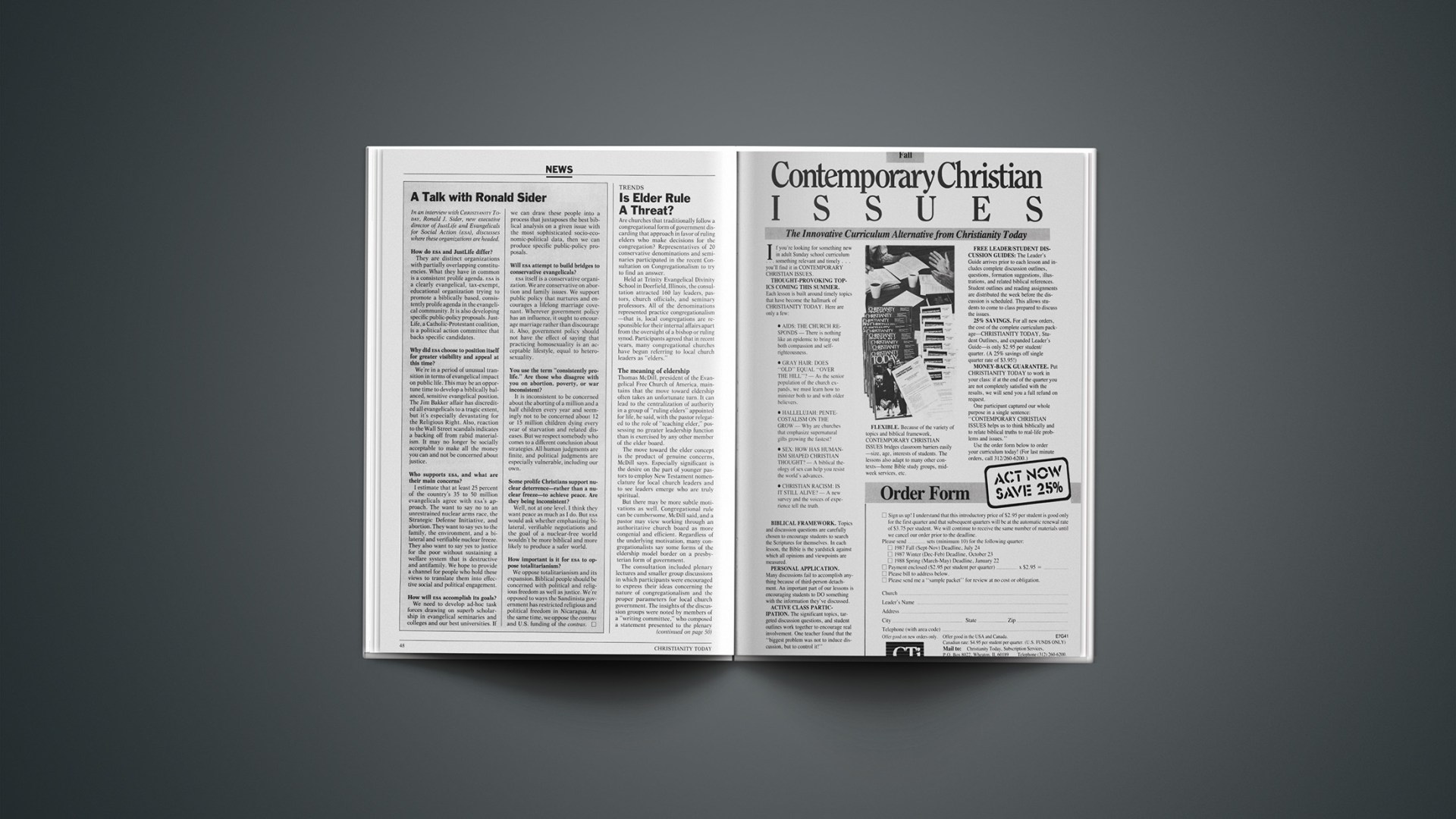In an interview with CHRISTIANITY TODAY, Ronald J. Sider, new executive director of JustLife and Evangelicals for Social Action (ESA), discusses where these organizations are headed.
How do ESA and JustLife differ?
They are distinct organizations with partially overlapping constituencies. What they have in common is a consistent prolife agenda. ESA is a clearly evangelical, tax-exempt, educational organization trying to promote a biblically based, consistently prolife agenda in the evangelical community. It is also developing specific public-policy proposals. JustLife, a Catholic-Protestant coalition, is a political action committee that backs specific candidates.
Why did ESA choose to position itself for greater visibility and appeal at this time?
We’re in a period of unusual transition in terms of evangelical impact on public life. This may be an opportune time to develop a biblically balanced, sensitive evangelical position. The Jim Bakker affair has discredited all evangelicals to a tragic extent, but it’s especially devastating for the Religious Right. Also, reaction to the Wall Street scandals indicates a backing off from rabid materialism. It may no longer be socially acceptable to make all the money you can and not be concerned about justice.
Who supports ESA, and what are their main concerns?
I estimate that at least 25 percent of the country’s 35 to 50 million evangelicals agree with ESA’s approach. The want to say no to an unrestrained nuclear arms race, the Strategic Defense Initiative, and abortion. They want to say yes to the family, the environment, and a bilateral and verifiable nuclear freeze. They also want to say yes to justice for the poor without sustaining a welfare system that is destructive and antifamily. We hope to provide a channel for people who hold these views to translate them into effective social and political engagement.
How will ESA accomplish its goals?
We need to develop ad-hoc task forces drawing on superb scholarship in evangelical seminaries and colleges and our best universities. If we can draw these people into a process that juxtaposes the best biblical analysis on a given issue with the most sophisticated socio-economic-political data, then we can produce specific public-policy proposals.
Will ESA attempt to build bridges to conservative evangelicals?
ESA itself is a conservative organization. We are conservative on abortion and family issues. We support public policy that nurtures and encourages a lifelong marriage covenant. Wherever government policy has an influence, it ought to encourage marriage rather than discourage it. Also, government policy should not have the effect of saying that practicing homosexuality is an acceptable lifestyle, equal to heterosexuality.
You use the term “consistently prolife.” Are those who disagree with you on abortion, poverty, or war inconsistent?
It is inconsistent to be concerned about the aborting of a million and a half children every year and seemingly not to be concerned about 12 or 15 million children dying every year of starvation and related diseases. But we respect somebody who comes to a different conclusion about strategies. All human judgments are finite, and political judgments are especially vulnerable, including our own.
Some prolife Christians support nuclear deterrence—rather than a nuclear freeze—to achieve peace. Are they being inconsistent?
Well, not at one level. I think they want peace as much as I do. But ESA would ask whether emphasizing bilateral, verifiable negotiations and the goal of a nuclear-free world wouldn’t be more biblical and more likely to produce a safer world.
How important is it for ESA to oppose totalitarianism?
We oppose totalitarianism and its expansion. Biblical people should be concerned with political and religious freedom as well as justice. We’re opposed to ways the Sandinista government has restricted religious and political freedom in Nicaragua. At the same time, we oppose the contras and U.S. funding of the contras.










